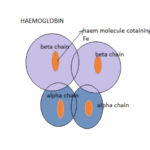Iron and Your Blood
Iron plays a key role in your health by helping red blood cells carry oxygen from your lungs to every cell in the body.
- Iron is a key part of a protein in red blood cells called hemoglobin, which binds to oxygen.
- Without iron, your body can’t make enough healthy red blood cells.
- A lack of iron means less oxygen gets delivered, which can make you feel tired, weak, or dizzy — this condition is called anemia.
- That’s why iron is so important: it keeps your blood cells strong and your body energized.
Journey of Iron
Iron comes from what we eat and travels through an amazing journey inside us.
- Iron is found in foods like red meat, beans, spinach, lentils, tofu, and cereals.
- There are two types: heme iron (from animals) and non-heme iron (from plants), with heme being easier to absorb.
- Vitamin C helps your body absorb non-heme iron better.
- Iron is absorbed mainly in the small intestine and travels through the blood to the bone marrow, where it helps to make hemoglobin.
- Extra iron is stored in the liver, spleen, and bone marrow for future use.
Fun Facts
Here are some interesting facts about iron:
- The average human body contains about 4 grams of iron — that’s just under a teaspoon!
- Your body recycles iron from old red blood cells.
- Babies are born with enough iron to last for about 6 months.
- Iron-rich blood gives muscles their red color, thanks to a protein called myoglobin.
Review
Let’s quickly recap what we learned about iron:
- What protein in red blood cells carries oxygen? Hemoglobin
- What condition can happen if you don’t get enough iron? Anemia
- Which vitamin helps absorb non-heme iron? Vitamin C
- Where in the body is iron absorbed? Intestine


Recent Comments